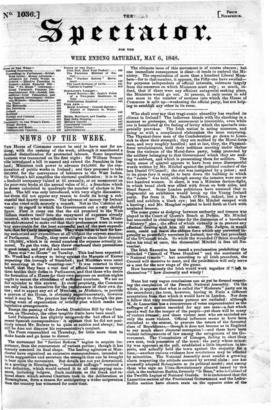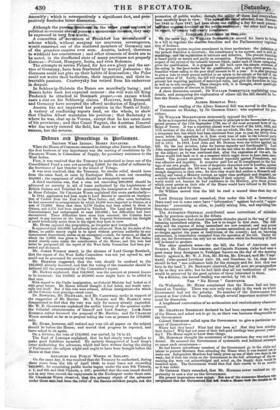None but very vague conclusions can as yet be formed
respect-. ing the complexion of the French National Assembly. On the whole, it appears that what is called the" Moderate" party are in the ascendant; the term, however, having in Paris a different acceptation from that which it would have in London. Nor does it follow that very troublesome persons are excluded: although M. de Lamartine has a concurrence of votes unprecedented as the suffrages of a nation recorded for any one man—a fact which speaks well for the temper of the people—yet there will be many of violent counsel; and those violent men who are excluded are only the more violent. Official influence seems to have been stretched to the utmost, to procure the return of the favoured class of Republicans,—though it does not become us in England to say much about electoral corruption !—and there have been violent infringements of law among the antagonists of the Go- vernment. The Communists of Limoges, failing to elect their own men, took possession of the town : the party whose minor- ity was apparent at the poll, established a little imperium in im- perio, and actually held the town against the majority for a time, another curious evidence how revolutions may be effected by minorities. The National Assembly meet amidst a growing alarm respecting the attitude assumed by several clubs : one has avowedly adopted Robespierre as its political model; and among those who sign an Ultra-Revolutionary placard issued by this club, is the turbulent Barbes, formerly "le Beau," who is Colonel of the Twelfth Legion of National Guards. It is understood that the Lamartine section of the Provisional Government and the Ledru- Rollin section have chosen seats on the opposite sides of the Assembly ; which is retrospectively a significant fact, and pros- pectively forebodes bitter dissension.



























 Previous page
Previous page